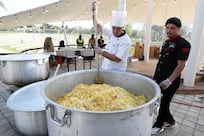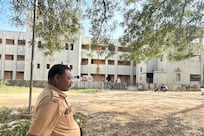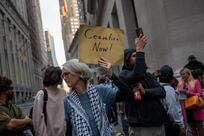Libya launched a desperate attempt yesterday to ward off the threat of immediate air strikes after France and Britain warned they would enforce "within hours" a UN Security Council resolution permitting military action.
Col Muammar Qaddafi's regime gave conflicting responses to the UN resolution, passed in yesterday's early hours, allowing "all necessary measures" to be taken to protect civilians caught up in the ruthless campaign to crush the Libyan uprising.
Meanwhile, Qatar became the first Arab nation to declare that it would join the international operation to end attacks on Libya's civilian population.
As the UN vote intensified the fast-moving crisis, Col Qaddafi was first reported to have thrown down a defiant challenge to nations committed to implementing a no-fly zone: "Hell awaits anyone who attacks Libya."
Within an hour, however, his foreign minister, Moussa Koussa, announced that Libya would impose an immediate ceasefire, abide by the UN resolution and halt all military operations against rebel forces.
Despite the apparent Libyan climbdown, sceptical western observers pointed out that Col Qaddafi, regarded as a past master of surprise, survival and intrigue, had limited time to prove good faith.
On Thursday night, as the UN prepared to vote, he had issued a chilling threat to rebels that "no mercy" would be shown as his troops sought to regain the rebel stronghold of Benghazi, the country's second-largest city.
Even after the foreign minister's statement on a ceasefire, Reuters news agency reported that Libyan forces had continued to pound targets in Misratah, 210km east of the capital Tripoli, killing 25 people.
The rebel spokesman Mustafa Gheriani dismissed the ceasefire announcement, saying Col Qaddafi's forces were also shelling the eastern city of Ajdabiya.
Supporters of the UN resolution emphasised their resolve to see its far-reaching terms enforced.
US President Barack Obama said the US will help its allies enforce the no-fly zone over parts of Libya Col Qaddafi does not immediately cease military actions against rebels.
However, he said the US would not send ground forces to Libya.
Arab countries opposing the brutal Libyan response are due to be represented when the French president, Nicolas Sarkozy, holds a meeting in Paris today to discuss the widest possible international participation in implementation of the UN resolution.
Qatar was the first Arab nation to announce that it would take part in enforcing the no-fly zone designed to stop Col Qaddafi's forces attacking rebels.
"Qatar decided to take part in the international efforts aimed at stopping the bloodshed and protecting civilians in Libya," said a statement from the official Qatar News Agency, which did not specify the role the country would take.
The British prime minister David Cameron told legislators in parliament that he had also received support in discussions with other Arab nations.
Diplomats involved in drafting of the UN resolution have said they expect the participation of other Gulf states in ensuring the no-fly zone is observed.
Mr Cameron said it remained for Col Qaddafi to show the ceasefire was genuine.
"We will judge him on his actions, not his words," he told the BBC. "What is absolutely clear is the UN Security Council resolution said he must stop what he is doing, brutalising his people. If not, all necessary measures can follow to make him stop."
France had set the tone for a day of solemn pronouncements, saying military operations would commence with minimum delay. François Baroin, the government's spokesman, said air strikes could take place "within a few hours", though he did not elaborate.
Mr Baroin's forceful approach, echoing comments made in New York by the French foreign minister, Alain Juppé, reflects Mr Sarkozy's desire to be seen to be supporting people opposing a harsh, discredited regime. France was roundly condemned for initially backing the Tunisian authorities' violent response to pro-democracy protests; the president has repeatedly said in recent weeks that Col Qaddafi "must go".
What is clear to most observers and military analysts is that the UN mandate for military action goes far beyond the enforcement of a no-fly zone. UN Security Council resolution 1973 highlights Libya's failure to honour a previous UN resolution seeking an end to Col Qaddafi's bloody response to civil unrest.
It authorises member states "to take all necessary measures … to protect civilians and civilian populated areas under threat of attack in the Libyan Arab Jamahiriya, including Benghazi".
The terms are broad enough to permit strikes not only against aircraft but Col Gaddafi's ground forces if this were considered necessary.
But the resolution expressly ruled out any suggestion of foreign forces occupying any part of Libyan territory.
It was supported by three permanent members of the security council - the United States, Britain and France - along with Bosnia and Herzegovina, Colombia, Gabon, Lebanon, Nigeria, Portugal and South Africa. Russia and China, also permanent members, abstained, as did Germany, Brazil and India.
France can quickly send warplanes from French bases, and also has its only aircraft carrier, Charles De Gaulle, in the Mediterranean with a fleet of fighter-bombers and early-warning aircraft.
Mr Cameron told the British parliament that Royal Air Force Tornado and Typhoon fighters were being deployed to the Mediterranean to join the international operation.
"The defence secretary and I have now instructed the chief of the defence staff to work urgently with our allies to put in place the appropriate military measures to enforce the resolution - including a no-fly zone," he said.
Mr Cameron added that the initial operation would involve a joint British, US and French mission with Arab support.
"Any decision to put the men and women of our armed forces into harm's way should only be taken when absolutely necessary," he said. "But I believe that we cannot stand back and let a dictator whose people have rejected him kill his people indiscriminately. To do so would send a chilling signal to others."
If military action goes ahead despite Libya's belated attempts to present a conciliatory face, fighters will seek to stop all flights in Libyan air space except those undertaken for humanitarian purposes.
According to The Washington Post, initial strikes would be likely to target air defence systems and runways. US officials were quoted as saying it would probably take several days for a full operation to be undertaken and that President Barack Obama had not yet approved the use of US military assets.
Other reports suggest the Obama administration would prepare to enforce the no-fly zone using fighters, bombers and surveillance aircraft - probably not before tomorrow - and working with unspecified help from Arab countries.
[ * With additional reporting by David Sapsted in London ]






